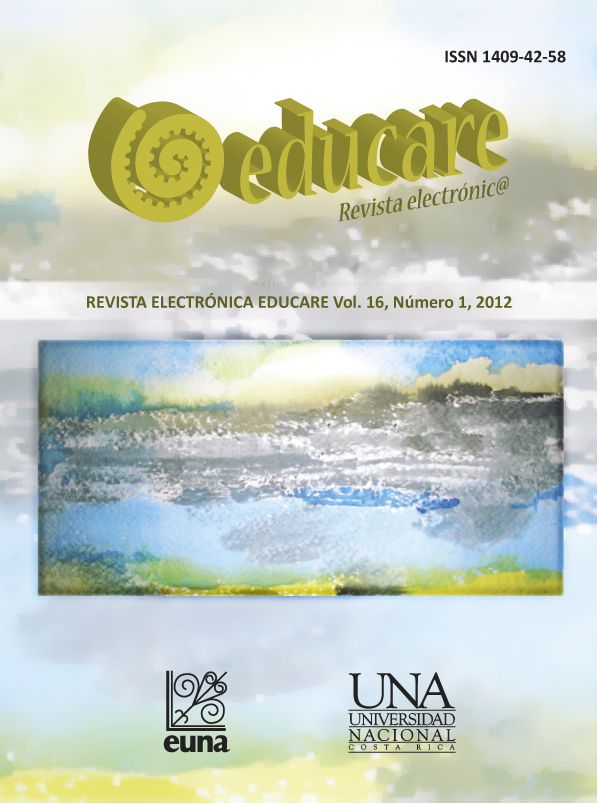Family as the Promoter of Independence Skills in Children with Motor Disabilities
DOI:
https://doi.org/10.15359/ree.16-1.8Keywords:
Family, independence, supportAbstract
This study developed an individualized proposal to promote, from the family context, the independence of two four-year-old children with motor disabilities. The proposal aimed at helping mothers and fathers to promote different skills within the family context. The results of this study revealed that when the families of children with disabilities are oriented, it is easier for them to start processes that otherwise would be postponed. As a result, it is recommended to create proposals to support the parents and help them to build their own family-growth processes and develop independence living skills in their children with motor disabilities.
References
Asociación Americana sobre Retardo Mental-AAMR. (2004). Retraso mental. Definición,
clasificación y sistemas de apoyo. Madrid, España: Alianza Editorial.
Campabadal, M. (2007). El niño con discapacidad y su entorno (4a reimpresión). San José, Costa
Rica: EUNED.
Fontana, A., Alvarado, A. L., Angulo, M., Marín, E. y Quiroz, D. (julio-diciembre, 2009). El apoyo
familiar en el proceso de integración educativa de estudiantes con necesidades educativas en
condición de discapacidad. Revista Electrónic@ Educare, 13(2),17-35. Recuperado de http://
redalyc.uaemex.mx/redalyc/pdf/1941/194114401003.pdf
Fantova, F. (noviembre-diciembre, 2000). Trabajar con las familias de las personas con discapacidades.
Siglo Cero, 31(192), 33-49.
Guía para la atención educativa a los alumnos y alumnas con discapacidad motora (s. f.) Andalucía,
España: Consejería de Educación y Ciencia.
Peñafiel, F. (1998). Discapacidad motora: intervención psicopedagógica. En M. Á Lou y N. López
(Coords.). Bases pedagógicas de la educación especial (pp. 235-252). España: Pirámide.
Póo, P. (2008). Parálisis cerebral infantil. Barcelona, España: Asociación Española de Pediatría.
Organización de las Naciones Unidas [ONU]. (2006). Convención sobre los derechos de las personas
con discapacidad. Nueva York. Estados Unidos.
Downloads
Published
How to Cite
Issue
Section
License
1. In case the submitted paper is accepted for publication, the author(s) FREELY, COSTLESS, EXCLUSIVELY AND FOR AN INDEFINITE TERM transfer copyrights and patrimonial rights to Universidad Nacional (UNA, Costa Rica). For more details check the Originality Statement and Copyright Transfer Agreement
2. REUTILIZATION RIGHTS: UNA authorizes authors to use, for any purpose (among them selfarchiving or autoarchiving) and to publish in the Internet in any electronic site, the paper´'s final version, both approved and published (post print), as long as it is done with a non commercial purpose, does not generate derivates without previous consentment and recognizes both publisher's name and authorship.
3. The submission and possible publication of the paper in the Educare Electronic Journal is ruled by the Journal’s editorial policies, the institutional rules of Universidad Nacional and the laws of the Republic of Costa Rica. Additionally, any possible difference of opinion or future dispute shall be settled in accordance with the mechanisms of Alternative Dispute Resolution and the Costa Rican Jurisdiction.
4. In all cases, it is understood that the opinions issued are those of the authors and do not necessarily reflect the position and opinion of Educare, CIDE or Universidad Nacional, Costa Rica. It is also understood that, in the exercise of academic freedom, the authors have carried out a rogorous scientific-academic process of research, reflection and argumentation thar lays within the thematic scope of interest of the Journal.
5. The papers published by Educare Electronic Journal use a Creative Commons License:














 The articles published by Educare Electronic Journal can be shared with a Creative Commons License:
The articles published by Educare Electronic Journal can be shared with a Creative Commons License: 



